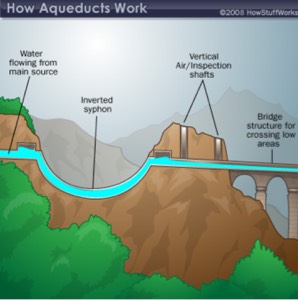Sign up for FlowVella
Sign up with FacebookAlready have an account? Sign in now
By registering you are agreeing to our
Terms of Service
Loading Flow

-Several of the 11 aqueducts of Ancient Rome, constructed between 312 BC and 226 AD, carried water all the way from Tivoli, about 43 miles away
-The longest of the aqueducts, Anio Novus, was nearly 60 miles in length
-At its height, Rome's system of aqueducts supplied each member of the populace with more than 265 gallons (1,000 liters) of water per day (that's more than many modern water systems can deliver)
-To achieve a consistent, shallow slope to move the water in a continuous flow, the Romans lay underground pipes and constructed siphons throughout the landscapes
-When siphons were impractical, which was very often, arches were constructed to span the valley. The pipes ran along the tops of the arches
-The pipes were typically built in concrete, but were sometimes built in lead when enough money was supplied from the government
Roman Aqueducts

-Siphons needed lead pipes to work efficiently, since the water had to pick up speed
-Access points were carved into the system so maintenance workers could access the pipes